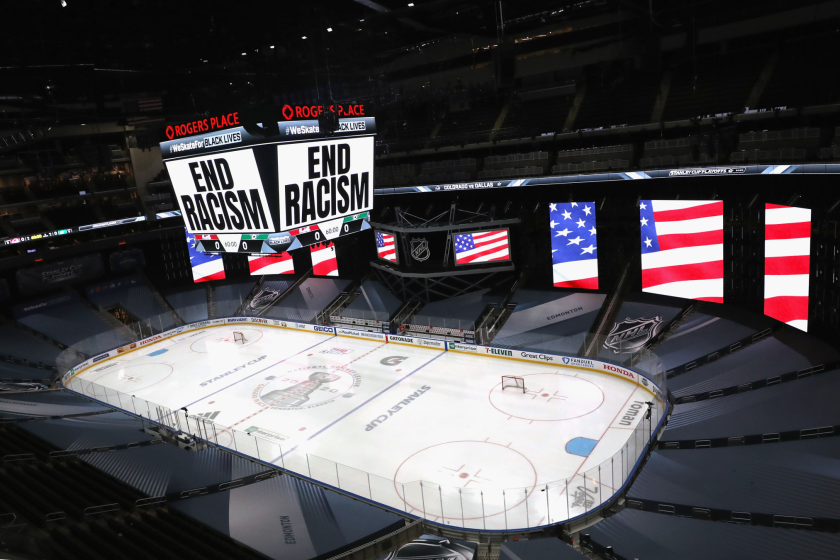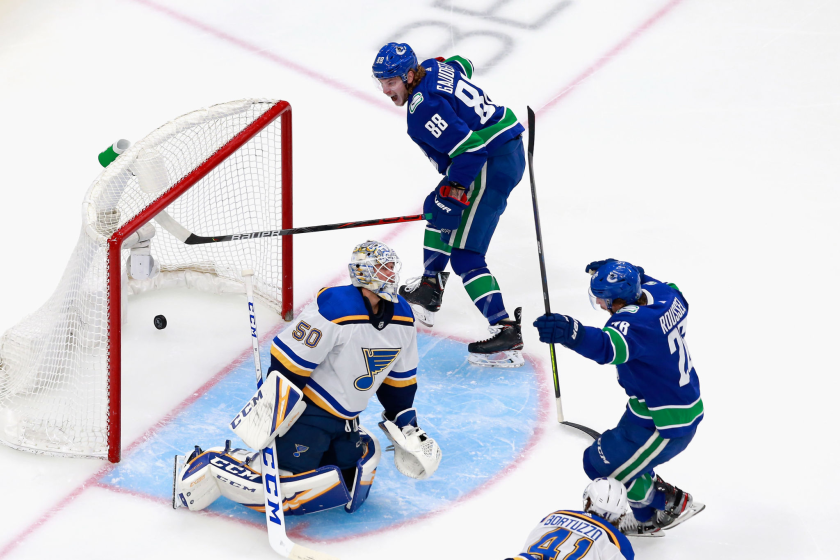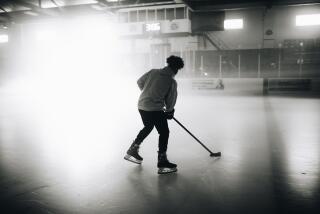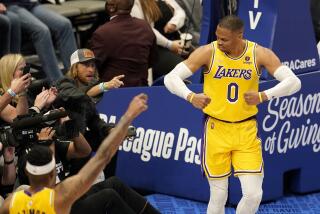Column: NHL players hope playoff protest is a real start toward battling racism
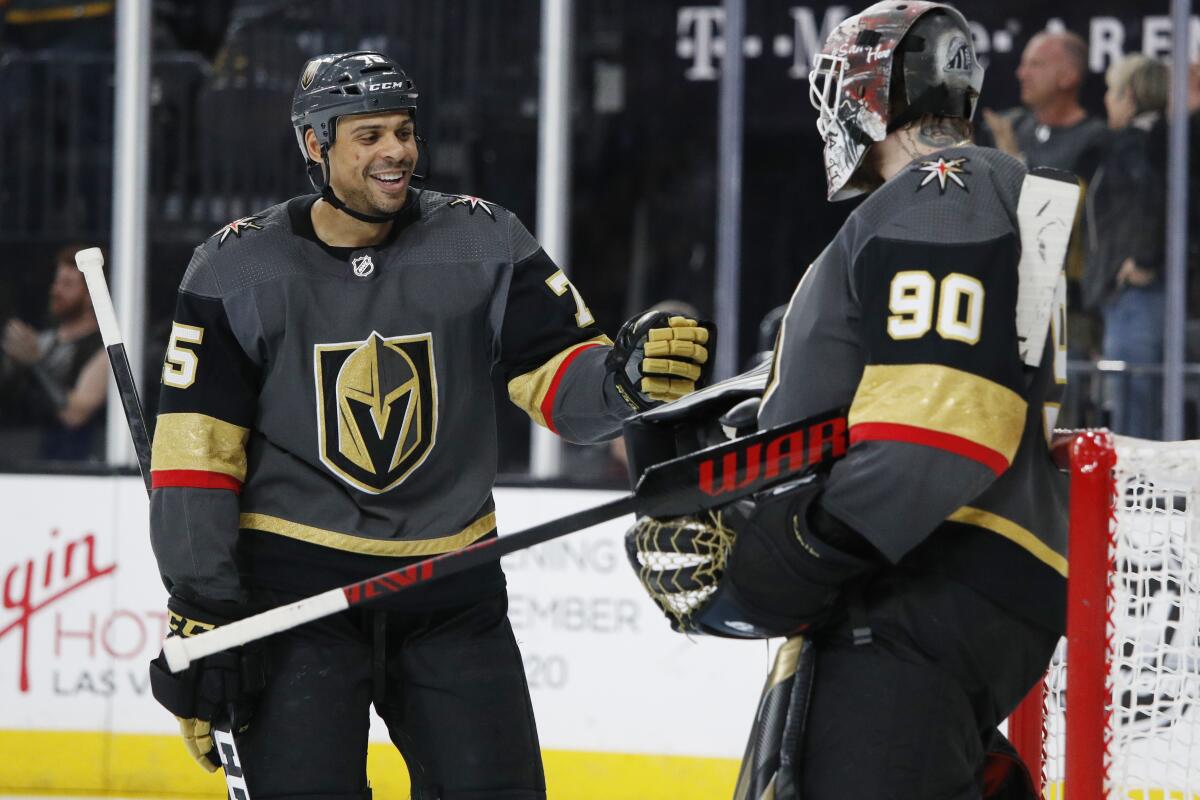
One Stanley Cup playoff game had concluded on Wednesday and players were preparing for the last two games when rumors they’d heard crystallized into fact. NBA and WNBA players were refusing to play, intensifying their protests of injustice and systemic racism. NHL players, some of them recently awakened from naps, had little time to digest the startling news. They believed it was their fight, too, but they didn’t know how to enter the fray.
After the NHL’s mild reaction Wednesday night — a few clichés and a cursory “moment of reflection” in Toronto — players began to talk among themselves to discuss their options. They soon crossed rivalry lines to include players on other teams in the Edmonton and Toronto playoff bubbles. “We had some discussions, then went to bed,” Boston Bruins center Patrice Bergeron said. “We already had some meetings planned with Tampa Bay in the morning and it snowballed from there and we met with the Islanders and Philly joined.”
In Toronto, players who had been fierce opponents the night before sat together on Thursday to explain why they wouldn’t play that day. In Edmonton, all four Western Conference teams gathered in an impressive display of solidarity while team leaders declared it was time to put action behind their well-meaning words. As a Black player in a league dominated by white men, Vegas Golden Knights forward Ryan Reaves is accustomed to being in the minority. On Thursday he was surrounded by brothers who have taken up his cause as their own.
“If you look around this room there’s a lot of white athletes in here, and I think that’s the statement that’s being made right now,” Reaves said. “It’s great that the NBA did this, and the MLB and the WNBA. They have a lot of Black players in those leagues. But for all these athletes in here, just to take a stand and say, ‘You know what, we see the problem, too, and we stand behind you.’ I go to war with these guys and I hate their guts on the ice, but I couldn’t be more proud of these guys. The statement they made today is something that’s going to last.
The NHL postponed playoff games scheduled for Thursday and Friday after a group of Black players requested a halt in the wake of Jacob Blake shooting.
“These two days [of postponements] isn’t going to fix anything. But the conversation and the statement that’s been made is very powerful, especially coming from this league.”
The games not played on Thursday and Friday were rescheduled to create TV tripleheaders on Saturday and Sunday. Every series has been close and generally entertaining, so the return to action will be welcome.
But players said it won’t be a return to business as usual because they consider the pause to be a launch point to expand discussions about ending racism in hockey and beyond. “It doesn’t matter who was here first. The whole point is that we’re all having the conversation at this point in time and we’re all looking to educate ourselves and wanting to improve,” said Tampa Bay defenseman Luke Schenn, a former King, who is white.
“We all realize that nothing’s going to be fixed by tomorrow morning, or nothing like that. But this is a situation where everyone needs to continue to learn and ask questions and do what’s right and be a good person in this world and educate your kids and show them the right way. It definitely is a long-term thing, but the point of the pause was to get everyone to kind of sit back and listen and reflect on where do we go from here.”
Where, indeed. Racism has been a thorny issue for the NHL, which had about two dozen Black players on team rosters last season.
FloridaHockeyNow.com reported on Friday that the league is investigating an allegation that former Florida Panthers general manager Dale Tallon uttered a racial slur while his team was in the bubble. In April, a video chat featuring New York Rangers prospect K’Andre Miller, who is Black, was hacked and he was subjected to racist slurs. Last November, Bill Peters resigned as coach of the Calgary Flames after acknowledging he had directed a racial slur to a player a decade earlier.
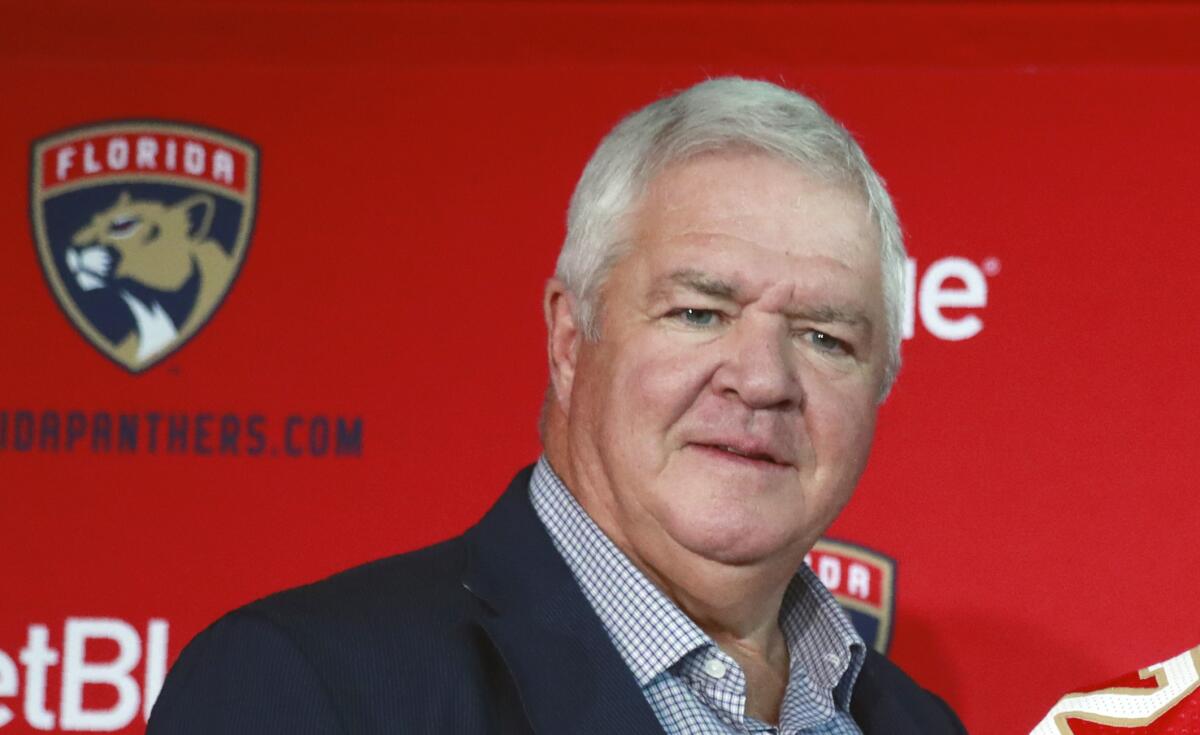
The Hockey Diversity Alliance, which is comprised of current and former NHL players and advocates for inclusion, issued a statement asking commissioner Gary Bettman to suspend games on Thursday “to allow players and fans to reflect on what happened and to send a message that human rights must take priority over sport.” The group, which became a source of guidance for other players during the week, also said the NHL hadn’t agreed to its requests that the league fund social justice initiatives, antiracism education and grassroots programs for minorities, but it hoped to secure those commitments from the league before the playoffs end.
Those are no-brainer moves for the NHL and the NHL Players’ Assn. The two groups also should follow the lead of the NBA and National Basketball Players Assn. in making U.S.-based teams’ arenas available as polling places.
The resumption of play and continued discussion of players’ desire for change is sure to produce contentious conversations among fans. Discourse on social media has split between those who praise athletes and teams for using their platforms to promote social causes and those who demand a separation between sports and the so-called real world. The line between sports and society blurred a long time ago, if it ever had firm shape, and it’s absurd to expect athletes to “shut up and dribble” for the pleasure of people who are uncomfortable hearing them express opinions outside the field of play. Listen or not, as you choose. There’s much to be learned.
The St. Louis Blues were flying high before the COVID-19 pandemic halted the NHL season. On Thursday, the Vancouver Canucks ended their season.
Bruins forward Brad Marchand, who is white, said players aren’t trying to be political, though he knows their actions will be construed as such. The stakes, he said, are bigger than hockey and bigger than sports. “Sports is a luxury. It’s a luxury to watch this game, to play this game,” he said Friday. “But when it becomes about people’s safety and people’s lives and people feeling comfortable to be in their own skin, it’s much more important than that.
“I understand people want to watch the games. And I understand people want to see this, but it’s too bad, you know? We have bigger things that we care about and want to do and improve upon and the people that we want to support, and that’s what matters.
“I don’t think any of us have the perfect solution, but obviously there are things we can all do to be part of it, and that’s what we’re going to continue talking about today and moving forward.”
More to Read
Go beyond the scoreboard
Get the latest on L.A.'s teams in the daily Sports Report newsletter.
You may occasionally receive promotional content from the Los Angeles Times.

